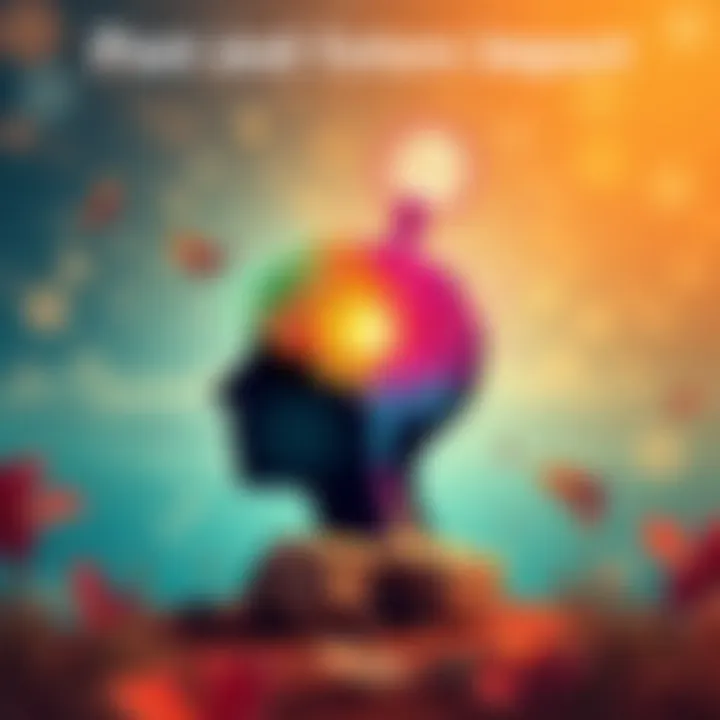Understanding Mindfulness Through Eckhart Tolle's Work


Intro
Eckhart Tolle's The Power of Now has captured the hearts and minds of countless readers across the globe. Its simple yet profound teachings invite individuals to step away from the chaos of everyday life, urging them towards a state of mindfulness that prioritizes the present moment. This article aims to unpack Tolle's insights, providing readers with a clearer understanding of how living in the now can transform their mental well-being.
In our fast-paced world, people often find themselves drowning in a sea of worries about the future and regrets from the past. This ongoing mental chatter can create an environment ripe for anxiety, stress, and discontent. Tolle's work challenges these habitual thought patterns, advocating for a shift in focus to the present, where true peace resides. Readers from various walks of life, including students, professionals, and avid readers, will benefit from exploring these ideas further.
To enrich our discussion, we will navigate through the categories of life-changing literature, specifically examining how Tolle's work fits within self-help and personal development genres. Further, readers will gain insights into the key takeaways from the book and how to effectively implement these principles into their daily routines.
By adopting Tolle's perspective, individuals can cultivate a deeper awareness, leading to enhanced mental resilience and a more fulfilling life. This exploration of The Power of Now not only reveals Tolle's philosophy but also provides practical strategies for adopting mindfulness within your own life.
Intro to Eckhart Tolle
Understanding Eckhart Tolle is like peeling a complex onion; each layer reveals more profound insights about existence and consciousness. Tolle’s teachings, especially in The Power of Now, resonate with a wide audience, making his philosophical perspectives relevant today. His journey from despair to enlightenment offers readers a roadmap for inner peace. This section highlights the significance of studying Tolle's life and works, providing context to his ideas about presence and mindfulness.
Biographical Overview
Eckhart Tolle was born as Ulrich Leonard Tölle in Germany in 1948. He experienced a tumultuous childhood, peppered with challenges that shaped his worldview. At the age of 29, after enduring a profound existential crisis, Tolle underwent a transformation that would change his life. He began to experience a sense of deep peace and awareness that led him to realize the importance of living in the present. Following this awakening, he migrated to Canada, where he shared his teachings with a wider audience. His works, particularly The Power of Now, have sold millions of copies and have been translated into multiple languages.
Tolle's compelling narrative creates a foundation for readers to explore their relationship with time and existence. The journey from a life clouded by anxiety to one illuminated by consciousness showcases the potential for transformation that lies within each person.
Tolle's Philosophical Influences
Several philosophical currents inform Eckhart Tolle’s thought process. Central to his ideas are concepts from Buddhism and various strands of Western philosophy. The emphasis on mindfulness and presence in Buddhism aligns seamlessly with Tolle’s teachings. The idea that the mind often dwells unnecessarily on the past or future can be traced back to Buddhist principles of non-attachment.
In addition, teachings from mystics like Meister Eckhart and teachings of the Christian mystical tradition influenced him. Tolle blends these philosophical perspectives, weaving them into actionable practices.
His work urges individuals to step out of mental traps, reduce the noise of thought, and find solace in the here and now. Tolle’s read on these philosophical influences underscores the universality of his thought; he creates a bridge linking ancient wisdom with contemporary issues. Ultimately, understanding Tolle’s influences lays the groundwork for comprehending the broader implications of The Power of Now and its transformative potential.
Understanding 'The Power of Now'
Eckhart Tolle's work, particularly The Power of Now, holds a pivotal position in contemporary discussions surrounding mindfulness, consciousness, and personal transformation. This section aims to break down the core aspects of understanding Tolle's message while recognizing its practical implications for readers.
Key Themes of the Book
At the heart of The Power of Now lies a few key themes that resonate with readers across different backgrounds. Here are some main ideas to consider:
- The Importance of Now: Tolle emphasizes the significance of living in the moment. He argues that many people are trapped in their thoughts about the past or worries about the future. This constant mental chatter distracts us from experiencing life as it is—right now, in the present.
- Acceptance: Another pivotal theme is acceptance. Tolle speaks about the necessity of accepting the current moment without resistance. He encourages readers to let go of the struggle to change their circumstances and embrace life as it unfolds.
- The Ego: Tolle suggests that the ego is a significant barrier to true happiness and presence. It’s the part of us that identifies with our personal history, societal roles, and material possessions. Understanding and overcoming the ego can lead to a deeper sense of peace.
- Consciousness and Awareness: The book also explores the idea of awakening to a deeper consciousness. Tolle invites readers to cultivate awareness of their thoughts and emotions, recognizing them as separate from their true selves.
"Realize deeply that the present moment is all you ever have. Make the Now the primary focus of your life." — Eckhart Tolle
Structure and Style
Tolle’s writing in The Power of Now is distinctively unique. It is conversational yet profound, inviting readers to reflect on their internal dialogues. The structure of the book is non-linear, which mirrors the concept of time being a fluid experience rather than a rigid structure. Here are key aspects of Tolle's style:


- Simple Language: Tolle employs clear, straightforward language that breaks down complex ideas into digestible bites. This choice makes the text accessible to a wider audience, encouraging readers from all walks of life to engage with its teachings.
- Dialogue Format: The book often shifts to a question-and-answer format. By anticipating the reader's inquiries, Tolle effectively addresses doubts and misunderstandings about mindfulness and presence.
- Reflective and Nuanced: His tone is introspective, inviting readers to pause and reflect on their own thoughts and feelings as they read. This method encourages deeper engagement with the material.
- Practical Exercises: Throughout the book, Tolle integrates practical exercises and meditations, reinforcing his teachings. These tangible tools enable readers to practice presence in everyday life, which enhances the learning experience.
Mindfulness and Presence
In the realm of psychological and spiritual well-being, the concepts of mindfulness and presence form the cornerstone of Eckhart Tolle's teachings. They invite us to step out of the relentless rush of our thoughts and immerse ourselves in the richness of each moment. Practicing mindfulness not only cultivates a deeper connection to our experiences but also offers a powerful antidote to the chaos of modern life. Here, we will explore the foundational aspects that underpin these concepts, their multifaceted benefits, and the hurdles we can face when striving to remain present.
Defining Mindfulness
Mindfulness, at its simplest, can be described as the conscious awareness of the present moment. This involves observing our thoughts, feelings, and bodily sensations without judgment. It’s like becoming an impartial spectator of our own life; we don’t get entangled in the dramas of our mind. Instead, we learn to watch them unfold. Tolle emphasizes that this practice is not about silencing the mind but acknowledging its contents and understanding how they shape our reality. In this way, mindfulness bridges the gap between our external environment and our internal experiences, allowing for a more coherent sense of self.
Unlike the occasional moment of sheer joy or sadness that quickly fades, mindfulness insists that we ground ourselves in the now, reminding us that it's all we truly have.
Benefits of Present-Centered Awareness
Living in the present offers numerous benefits that extend beyond mere momentary happiness. Here are several noteworthy advantages associated with cultivating a present-centered awareness:
- Reduction of Stress: By focusing on the current moment, we often let go of worries regarding past and future, which are primary sources of anxiety.
- Enhanced Concentration: When we are mindfully engaged, our ability to focus improves, making us more efficient and productive.
- Deeper Relationships: Being present encourages us to listen actively and respond thoughtfully, drastically improving interpersonal connections.
- Increased Creativity: Breaking free from the constraints of habitual thinking fosters innovative ideas and enhances problem-solving capabilities.
- Greater Emotional Resilience: By observing emotions without attachment, we develop the ability to respond constructively rather than react impulsively.
"Awareness is the greatest agent for change." - Eckhart Tolle
These benefits are not just feel-good additions to a lifestyle; they contribute to a profound transformation in how we navigate both everyday life and the unpredictability of various situations we encounter.
Challenges to Being Present
Despite the unmistakable advantages of mindfulness, many individuals find it a daunting and challenging endeavor. A common stumbling block is the habitual inclination to dwell on past events or brood over future uncertainties. Some of the prominent challenges include:
- Distractions: Constant notifications from devices, multitasking, and the ever-present allure of entertainment can pull us away from experiencing the now.
- Cognitive Patterns: Often, our minds are wired to generate thoughts about what could or should have been instead of focusing on what currently exists.
- Emotional Resistance: Engaging with present emotions can be uncomfortable, leading many to shy away from authenticity in feelings.
- Societal Pressure: The fast-paced nature of modern life promotes a culture of urgency, often glorifying busyness over mindful living.
Though these challenges can create barriers, it is vital to recognize that mindfulness is a skill that can grow with practice. Acknowledging these obstacles is the first step toward overcoming them and fostering a lifestyle centered around mindfulness and presence.
The Role of Thought and Emotion
Eckhart Tolle's teachings in The Power of Now place immense importance on the interplay between thought, emotion, and our perception of reality. Recognizing the connection between these aspects can help individuals achieve deeper mindfulness, thereby facilitating a more fulfilling life experience. In doing so, we must consider the influence of the ego, the impact of past experiences, and the fear tethered to future anxieties. All of these directly affect our present state of being, shaping our responses and relationships in profound ways.
Understanding the Ego
The notion of the ego plays a pivotal role in Tolle's philosophy. He describes the ego as a construct that creates a false sense of identity based on external factors such as achievements, possessions, or social status. This illusion can lead to unnecessary suffering. When we anchor our self-worth in fluctuating circumstances, we set ourselves up for disappointment. The ego invites a constant comparison with others, breeding discontent. Tolle emphasizes that becoming aware of the ego is a crucial first step toward liberation from its confines. By observing our thoughts without identification, we can begin to dismantle this layer of the self that often distorts our perception of reality.
Impact of Past Experiences
Our past experiences cast long shadows over our present, often leading us to react based on learned behaviors rather than genuine emotions. Tolle articulates that many of us carry around traumas or unprocessed emotions, which manifest through negative thoughts and behaviors. For example, someone who has faced betrayal may struggle with trust issues in new relationships. This echo of the past can distort one's capacity to engage authentically with others. Thus, an understanding of this dynamic becomes essential for cultivating presence. Addressing emotions tied to past experiences involves the difficult task of acknowledging these feelings without letting them dictate our actions. As we process and understand our past, we create space for healing, allowing a truer version of ourselves to emerge.
Future Anxiety and Anticipation
The future is often envisioned through a lens of anxiety and anticipation, clouding our ability to live fully in the now. The emotive pull of what could happen, often catastrophic in our mind's eye, dismisses the present moment's fragility and beauty. Tolle argues that worrying about the future is a common trap, leading to a cycle of stress and further detachment from reality. The feeling of needing to control outcomes can breed an unhealthy relationship with time itself.


To counter this tendency, it is vital to cultivate an attitude of acceptance and trust. Practices such as grounding exercises can help anchor us in the present, allowing us to face uncertainty with curiosity instead of fear. Mindfulness techniques, such as focusing on breath or engaging in simple daily rituals, can assist in developing emotional resilience while appreciating the transient nature of life.
"Realize deeply that the present moment is all you have. Make the Now the primary focus of your life." - Eckhart Tolle
Through the lens of thoughts and emotions, Tolle’s philosophy urges us to develop a mindful awareness of how these elements interact and shape our lives. Recognizing and understanding the ties between the past, ego, and future worries empowers individuals to address their emotional struggles while uncovering the joy and peace that exist in the present.
Practical Applications of Tolle's Teachings
Eckhart Tolle's work emphasizes not just understanding concepts, but applying them to everyday life. The practical applications of his teachings present an opportunity to transform the mundane into extraordinary experiences. Engaging with the principles outlined in The Power of Now can lead to a profound shift in perspective that influences mental well-being, relationships, and overall life satisfaction.
Meditative Practices for the Present
Meditation is one of the cornerstones of Tolle's philosophy. He encourages individuals to become aware of their thoughts and emotions without judgment, fostering a state of presence.
- Breathing Exercises: Focusing on your breath serves as an anchor. Take a moment to simply notice the inhale and exhale, letting thoughts drift away. This simple act cultivates a deeper connection to the present.
- Body Scan Meditations: Engaging in body scans allows you to attentively observe sensations throughout your body. It can be a grounding experience, illuminating areas of tension that you may not consciously recognize.
- Guided Mindfulness Meditations: Resources like Headspace and Calm offer structured sessions that leverage Tolle's approach. Following a guide can ease you into a habit of mindfulness.
These practices not only heighten awareness but also illuminate the joy found in the here and now.
Integrating Mindfulness in Daily Life
Mindfulness should not be confined to meditation sessions; it is a way of life. Tolle emphasizes that every moment is an opportunity for presence. There are tangible ways to weave mindfulness into the fabric of daily routines:
- Mindful Eating: Paying attention to each bite can turn a simple meal into a sensory experience. It fosters appreciation and can even alter your relationship with food.
- Walking Meditations: As you walk, notice the sensation of each step. This practice transforms a regular commute into a mindful journey. Each footfall can connect you to the earth and provide clarity in motion.
- Active Listening: When engaging with others, practice listening without formulating a response in your mind. This creates connection and deepens relationships, as you fully engage with the speaker.
By embedding mindfulness in daily activities, one can begin to savor life’s nuances that often go unnoticed. This practice cultivates a sustained sense of presence, leading to greater peace and insight.
Transforming Relationships Through Presence
Tolle’s insights extend beyond the self to the realm of interpersonal relationships. Many misunderstandings stem from a lack of presence, where individuals may either dwell on past grievances or project future fears onto their interactions. Cultivating presence can radically change the dynamics of relationships:
- Avoid Reactivity: When disagreements arise, pause. Responding from a place of presence allows for more constructive conversations, as you detach from solely ego-driven reactions.
- Fostering Empathy: Being fully present enables deeper connections, as it shifts the focus from ourselves to the other person. Empathy can flourish when we listen to our loved ones without distractions.
- Deepening Intimacy: Genuine presence in relationships can lead to profound intimacy. Shared moments, whether through conversation or silence, become cherished memories instead of passing occurrences.
In essence, being present transforms not just how we perceive ourselves, but significantly enriches our connections with others. Every interaction becomes an opportunity to engage meaningfully.
"The primary cause of unhappiness is never the situation but your thoughts about it." - Eckhart Tolle
These applications of Tolle's teachings not only offer strategies to navigate the complexities of modern life, but also cultivate a sense of peace that can ripple through every facet of existence.
Critical Perspectives on Tolle's Work
Eckhart Tolle's work has undeniably ignited discussions across various spectrums, eliciting adulations and critiques alike. Understanding these critical perspectives is key to grasp how Tolle’s ideas resonate with or repel certain audiences. This section aims to unfurl the layers of criticism surrounding 'The Power of Now' and explore how his philosophies clash or align with contemporary thought. By diving into these perspectives, not only do we understand the essence of Tolle's message, but we also appreciate the challenges it faces in the broader discourse on mindfulness and presence.
Analysis of Common Critiques


Many skeptics often center their criticisms on how Tolle approaches practical application. Some argue that his philosophies, while profound, might lack concrete pathways for implementation in real-world scenarios. For instance, a common refrain is that his guidance can seem abstract and ethereal—"just be present," they might say without providing the nitty-gritty steps to achieve such a state. Certainly, while the essence of mindfulness often resides in simplicity, critics highlight that this simplicity may not be accessible or beneficial to everyone.
Another critique stems from the idea that Tolle oversimplifies complex psychological issues. His assertion that the ego represents the source of human suffering can lead individuals to believe that personal struggles can be easily remedied by merely acknowledging the present moment, which some deem as reductionist. Critics suggest that by suggesting a singular source of suffering, Tolle may inadvertently dismiss the multifaceted nature of mental health, which can include biological and societal factors.
"Understanding modern psychology requires recognition that thoughts and emotions are influenced by a tapestry of past experiences, not just ego."
Additionally, some critics argue that Tolle’s focus on the present moment might lead to a form of avoidance regarding legitimate concerns about the future. In striving for present-centered awareness, there lies a worry that individuals may neglect meaningful planning or fail to address unresolved issues from their past. Therefore, the call to "be here now" could inadvertently pave the way for neglect in personal development or neglecting pressing responsibilities.
The Relevance of Tolle's Ideas Today
Despite the critiques, Tolle's ideas resonate with many, particularly in today's fast-paced, hyper-connected world. The persistence of anxiety and depression in modern society creates a fertile ground for Tolle's philosophies to take root. The increasing fragility of mental health lends a critical lens to the importance of mindfulness, making Tolle's suggestions relevant, even vital.
Many find solace in Tolle's reminder to draw attention back to the present, especially when daily stressors can feel overwhelming. In a world saturated with distractions, where the rush of future deadlines obscures the beauty of now, his work emerges like a lighthouse in turbulent seas. His emphasis on conscious breathing and awareness can be a toolkit for navigating life's storms.
Moreover, the accessibility of Tolle's ideas is noteworthy. Books, podcasts, and online discussions proliferate, making his teachings easily reachable for the general public. Communities often form around these concepts, allowing individuals to share personal stories of transformation inspired by Tolle's work. Tolle’s insights invite examination and engagement that ignite personal inquiry, a journey that both skeptics and fans embark upon together.
Relevant Resources
- Wikipedia - Eckhart Tolle
- Britannica - Mindfulness
- Reddit - Discussions on Mindfulness and Tolle
- APA on Mental Health Concerns
- Calm - Mindfulness Resources
Through unearthing critiques and contemporary relevance, we not only appreciate Tolle's work but also prepare ourselves for the transformative journey it proposes.
Epilogue: The Lasting Impact of 'The Power of Now'
In a world often drowned in noise and distractions, Eckhart Tolle's work serves as a beacon, guiding individuals back to the roots of mindfulness and presence. The importance of this conclusion lies not just in summarizing Tolle’s teachings, but in emphasizing their enduring relevance in our fast-paced lives. As more people grapple with stress, anxiety, and the overwhelming demands of modernity, the principles outlined in 'The Power of Now' become increasingly vital.
This book invites readers to confront the pervasive habit of dwelling on the past or worrying about the future. Instead, Tolle proposes an alternative — a focus on the now, a moment that can be replete with peace, clarity, and fulfillment when approached mindfully. The simple yet profound idea that the present moment is all we truly possess resonates deeply, offering solace and a path to emotional well-being.
Unpacking the main insights Tolle shares, we find a range of benefits:
- Enhanced mental health: By anchoring oneself in the present, individuals often experience reduced anxiety and a greater sense of calm.
- Improved relationships: Presence fosters deeper connections by urging communicators to engage genuinely without the fog of distractions.
- Cultivation of patience and resilience: Living in the now enables a more measured response to life’s challenges instead of reactive tendencies fueled by past grievances or future fears.
Reflecting on these considerations, one realizes that ‘The Power of Now’ is not merely a self-help book. It is a guide towards a profound transformation in how we perceive and experience our lives. This book makes a case that one’s mindset can drastically shift from one of reaction and fear to one of acceptance and peace. It also acts as a call to action for those seeking a more fulfilled existence, nudging toward practices that encourage living fully in each moment.
"Realize deeply that the present moment is all you ever have. Make the NOW the primary focus of your life." – Eckhart Tolle
As we wrap up our exploration, this lasting impact becomes clear. Tolle's teachings challenge us to consider how much time we waste fixating on what has been and what might come — and to realize that the richness of life is tied to the awareness of now. Whether or not one adopts every tenet from his work, the essence of embracing the present is a transformative journey worth undertaking. By doing so, we forge a path toward greater contentment, resilience, and awareness that echoes through every facet of existence.
Summary of Key Insights
Here’s a concise wrap-up of what we uncovered throughout Tolle’s work:
- The importance of mindfulness as a means to navigate life's complexities.
- Insights into how our thought patterns can hinder our peace.
- Recognition of how being present can dramatically alter perceptions and improve overall well-being.
- Understanding the significance of the ego and its influence on our emotional states.
Encouraging a Transformative Journey
Every reader is invited to take a step towards implementing Tolle’s teachings. Start simple:
- Practice daily meditation: Dedicate a few minutes each day to centering yourself.
- Create reminders: Place prompts around your living spaces that encourage you to breathe and refocus on the present.
- Engage in nature: Spend time outdoors, appreciating the sights, sounds, and sensations that the present moment offers.
- Limit distractions: Identify triggers that pull you away from the now and take action to mitigate them.
The goal is not perfection but awareness. The more consistent you become with these practices, the more transformative the effects will be. Acknowledging that this is a journey, one steeped in ups and downs, makes the pursuit all the more meaningful. Over time, the lessons of presence may lead to a richer, more fulfilled life, echoing the sentiments laid out in Tolle's timeless work.















